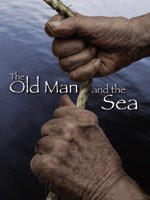 Often times, the main character of a story struggles with conflicts. These conflicts, either external or internal, have an extreme effect on that specific character, by affecting the way the act, or the things they do. In this novella, The Old Man and the Sea, the main character Santiago has to go through many external conflicts. He has to battle an injured hand; he has to survive out on the water without the proper tools and equipment for the several days he will be out there, and finally, he has to deal with numerous sharks attacking his prized marlin that he tried so hard to catch.
Often times, the main character of a story struggles with conflicts. These conflicts, either external or internal, have an extreme effect on that specific character, by affecting the way the act, or the things they do. In this novella, The Old Man and the Sea, the main character Santiago has to go through many external conflicts. He has to battle an injured hand; he has to survive out on the water without the proper tools and equipment for the several days he will be out there, and finally, he has to deal with numerous sharks attacking his prized marlin that he tried so hard to catch.
While being out on the water for days, Santiago had been chasing a huge marlin. This fish, if caught, would be his so called prized catch. He hasn’t caught a fish in 84 days, so he was determined to get this beauty. In order to get this fish, he battled for days with this marlin. He had endless fights with this beast. Santiago’s hands had been worn out and torn apart by the chords he had been holding for so long. “You can let the cord go, hand, and I will handle him with the right arm alone until you stop that nonsense”. (Pg 59) But, he thought about Joe DiMaggio, and how he didn’t let a bone spur affect him. So he stayed with it, and gave forth his best effort to get the fish.
Also, Santiago struggled with something he could have prevented. Santiago set out to fish for a day. So, he brought only enough tools to fish for one day. But the unplanned happened, and a huge marlin caught the old mans eye. He had to bag this catch. He chased this fish for many more days then he expected. Since he only had enough tools for a day, he had nothing to help him survive while out on the water for that long. For a catch of this magnitude, it requires more then one person. He did not have Manolin for this journey, so that put him at a grave disadvantage. But the main thing he struggled with, was not having enough tools, was not the fact that he did not have another fishermen, but the real danger, was the fact that he had no food to survive. He couldn’t catch a fish to eat, and he didn’t have enough money to buy some food for him self. Even on land, Santiago had to borrow money to buy food. “I must thank him.” “[He has done this before]” (Pg. 34) At that time, he borrowed food from the owner of the store. He had been gracious enough to help the old man out.
The last conflict Santiago struggled with was something that no one could ever predict, or defend against. He finally caught the catch of his life. He was so happy and proud of himself, until the unexplained happened. A shark, came out of no where, and started biting on his prized catch. After realizing what had happened, he attempted fighting off the shark and he fought it all the way back to shore. “But I killed the shark that hit my fish, he thought”. (Pg 103) When he got to shore, there was nothing left on the fish except its bare bones. The shark ate everything. Santiago had nothing to show for his diligent work he put forth to catch that fish. This caused Santiago to decipher whether or not he had a success or a failure. I believe he achieved his goal. I do because he caught his fish that he had longed for. He couldn’t have controlled the shark to get it away from his catch.
In every book, the characters struggle with something. Whether it is external conflicts or internal conflicts, the novella, The Old Man and the Sea, is no exception to that pattern. He overcame his injured hand, like Joe DiMaggio overcame his bone spur, he found a way to survive without enough supplies for himself, and he found a way to praise himself even after his prized catch had been attacked by a shark. These conflicts made the plot of the novella. They also made Santiago the way he was. If it was not for these conflicts, Santiago wouldn’t have been as determined to do the things he did. He was like Rocky Balboa. In the sense that he did not give up when the times were getting tough. He gained these attributes when he was faced with awful times. That is how conflicts make the character the way they are.
Monday, March 5, 2007
By Mike C.
 11:14 AM
11:14 AM
 Mr. B-G
Mr. B-G




0 comments:
Post a Comment